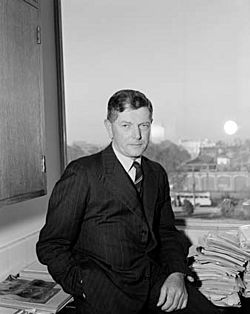Frank Macfarlane Burnet facts for kids
Quick facts for kids
Frank Macfarlane Burnet
|
|
|---|---|

Sir Frank Macfarlane Burnet in 1945.
|
|
| Born | September 3, 1899 |
| Died | August 31, 1985 (aged 85) Port Fairy, Australia
|
| Occupation | virologist |
| Known for | Nobel Prize in Physiology or Medicine in 1960 |
Sir Frank Macfarlane Burnet (born September 3, 1899 – died August 31, 1985) was a famous Australian scientist. He studied tiny living things like viruses. This field is called virology.
In 1960, he won a Nobel Prize in Physiology or Medicine. This award was for his important work on how our bodies fight off sickness. This field of study is called immunology. His discoveries helped us understand how our immune system works.
Contents
Early Life and Education
Frank Macfarlane Burnet was born in Traralgon, a town in Victoria, Australia. He was born on September 3, 1899. From a young age, he was very interested in science.
He went to Geelong College for his schooling. Later, he studied medicine at the University of Melbourne. He earned his medical degree in 1922. After that, he continued his studies in London, England.
Discovering How Viruses Work
Burnet spent much of his career studying viruses. Viruses are tiny germs that can make us sick. He researched how viruses infect cells and how our bodies react to them.
He worked at the Walter and Eliza Hall Institute of Medical Research in Melbourne. This institute is a famous place for medical research. Burnet became the director there in 1944.
One of his important discoveries was about the influenza virus. He found out how the flu virus changes over time. This helped scientists understand why we need new flu vaccines each year.
Understanding Our Immune System
Burnet's most famous work was in immunology. This is the study of the immune system. Our immune system is like our body's defense team. It protects us from germs and diseases.
He developed a theory called "clonal selection theory." This theory explains how our immune system learns to fight off specific germs. It says that when a germ enters our body, certain immune cells are "selected" to multiply. These cells then create antibodies to fight that specific germ.
This idea was a big breakthrough in medicine. It helped us understand how vaccines work. It also explained why our bodies can remember past infections.
Nobel Prize and Later Life
In 1960, Sir Frank Macfarlane Burnet won the Nobel Prize in Physiology or Medicine. He shared the prize with a British scientist named Peter Medawar. They won for their discoveries about how the immune system recognizes "self" from "non-self." This means how our body knows which cells belong to it and which are invaders.
After winning the Nobel Prize, Burnet continued his research. He also wrote many books and articles. He was a respected scientist and a leader in the medical community.
Sir Frank Macfarlane Burnet passed away on August 31, 1985. His work greatly changed how we understand diseases and how our bodies fight them.
Images for kids
-
Peter Colman, a scientist from CSIRO, showing his flu protein model to Frank Macfarlane Burnet
See also
 In Spanish: Frank Macfarlane Burnet para niños
In Spanish: Frank Macfarlane Burnet para niños
 | Emma Amos |
 | Edward Mitchell Bannister |
 | Larry D. Alexander |
 | Ernie Barnes |






